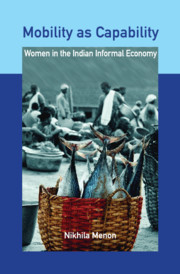Book contents
- Frontmatter
- Dedication
- Contents
- List of Tables
- List of Figures
- Preface
- 1 Transformational Mobility as Capability
- 2 Reflections on Transformational Mobility, Autonomy, and Women's Work
- 3 Women in ‘Kerala Model’: Myths and Realities
- 4 Situating Informal Work by Women in Fisheries in Kerala
- 5 ‘Measuring Mobility’ of Women: Unravelling the ‘Explicit’ and the ‘Implicit’
- 6 Pathways to Transformational Mobility of Women Workers: A Qualitative Comparative Analysis
- 7 ‘Subordinating Self’: ‘Manoeuvring Patriarchy’ among Women Workers
- 8 Self-Categorization, Group Identity, and Agency among Women Fish Vendors
- 9 Transformational Mobility: From Individual to Collective Agency of Informal Women Workers
- Bibliography
- Index
5 - ‘Measuring Mobility’ of Women: Unravelling the ‘Explicit’ and the ‘Implicit’
Published online by Cambridge University Press: 24 May 2020
- Frontmatter
- Dedication
- Contents
- List of Tables
- List of Figures
- Preface
- 1 Transformational Mobility as Capability
- 2 Reflections on Transformational Mobility, Autonomy, and Women's Work
- 3 Women in ‘Kerala Model’: Myths and Realities
- 4 Situating Informal Work by Women in Fisheries in Kerala
- 5 ‘Measuring Mobility’ of Women: Unravelling the ‘Explicit’ and the ‘Implicit’
- 6 Pathways to Transformational Mobility of Women Workers: A Qualitative Comparative Analysis
- 7 ‘Subordinating Self’: ‘Manoeuvring Patriarchy’ among Women Workers
- 8 Self-Categorization, Group Identity, and Agency among Women Fish Vendors
- 9 Transformational Mobility: From Individual to Collective Agency of Informal Women Workers
- Bibliography
- Index
Summary
The reinvention of daily life means marching off the edge of our maps.
—Lucy Parsons, anarchist and labour organizerMobility or freedom to move has multiple domains, especially for women. As peeling workers and fish vendors, women in fisheries in Kerala are comparatively very mobile in terms of moving out of the household for work on a daily basis. I have tried to explore the various domains of mobility as experienced by women workers engaged in informal work1 in fisheries in the cultural context of Kerala. Whether women in different types of informal work in fisheries are able to have similar mobility levels in various domains (spaces) of mobility is a pertinent question to analyse mobility as capability. When there are constraints on mobility, it stifles the well-being freedoms of women, and by measuring the mobility of women and analysing ‘transformational mobility’ (TM), it advances the understanding of mobility, work, and autonomy, and the intersectionality in the context of gender.
The interviews which I had with informal women workers brought me into a complex dilemma where I found myself questioning the extant understanding of ‘mobility’ as a concept. Mobility as a concept is mostly considered as something which is only the ‘visible’ and the ‘explicit’. If a woman is allowed to move outside the household and undertake work, she is considered ‘mobile’ and also having some amount of autonomy as regards her mobility is concerned. She is considered in charge of her movements to various places outside the household since she works outside the household. However, my interviews and survey of informal women workers reveal that in the case of peeling workers and fish vendors, their working outside the households does not guarantee autonomy of mobility in various domains or social/religious/ personal spaces in the society. For instance, Leela, a 46-year-old peeling worker, comments on her inability to move around without permission and her thoughts on gendered mobility were stated thus:
I cannot even go to work without his [husband’s] permission. Initially he opposed a lot my joining peeling work; now because of the need for money to meet children's education, he has given permission. However, he is always suspicious as peeling sheds are all dingy closed sheds and people spread bad rumours about peeling workers like us because they cannot see what we do inside.
- Type
- Chapter
- Information
- Mobility as CapabilityWomen in the Indian Informal Economy, pp. 66 - 92Publisher: Cambridge University PressPrint publication year: 2021

